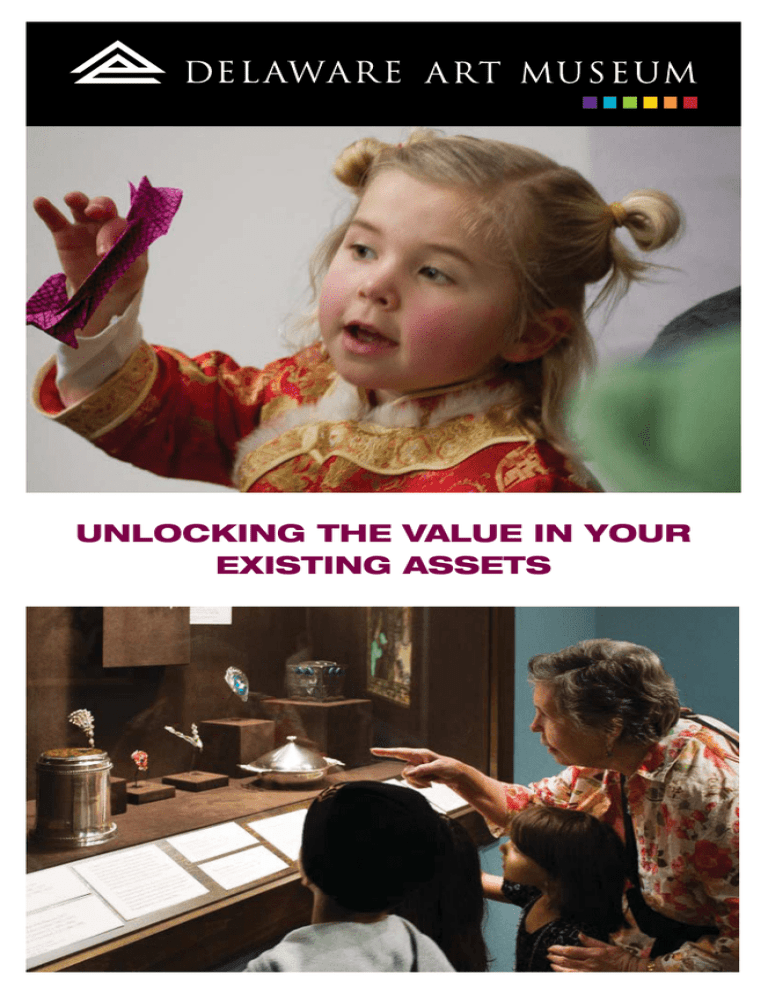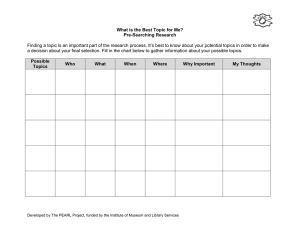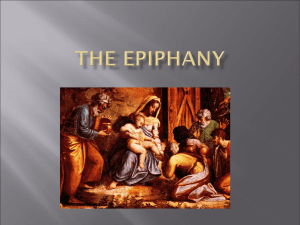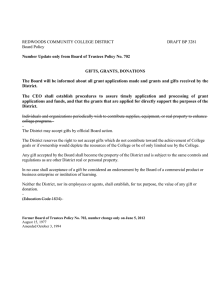unlocking the value in your existing assets
advertisement

UNLOCKING THE VALUE IN YOUR EXISTING ASSETS convenience of making a single charitable gift to one fund and then distributing the assets to many charities. The Museum is pleased to accept a gift through your DAF. Simply provide your DAF provider with our name, address, tax identification number (51-0065746), and the designation for your gift. You can also name the Museum as the residuary beneficiary of the remainder in your DAF. Gifts from Retirement Plans If your qualified retirement plan assets (those held in an IRA, 401(k), 403(b), Keogh, etc.) make up a significant portion of your net worth, you may want to consider using these assets in support of the Museum. Beneficiary Designation: The most common way to use retirement plans to make a charitable gift is to name “Delaware Art Museum” as a beneficiary on the account using a standard “Change of Beneficiary” form. You can direct all or part of the account proceeds be paid to the Museum after your passing. Not only does this create a lasting legacy, it also can save your estate from an income and estate tax burden that can exceed 60% of your plan assets. Gifts of Real Estate The Delaware Art Museum connects people to art, offering an inclusive and essential community resource that through its collections, exhibitions, and programs generates creative energy that sustains, enriches, empowers, and inspires. There are many different assets that can be used to help support our Mission. The best asset for your gift will be determined by you and your advisors, considering your entire tax situation. We have outlined a few options when considering a gift to support the Delaware Art Museum. Assets that can be used to make a gift Gifts of Cash Cash remains the simplest and most popular type of charitable gift. Your cash gift is fully deductible. If your cash gift exceeds 50% of your adjusted gross income for this year, you can carry the deduction forward for up to five additional years. Your gift can be made using cash, check, wire transfer, money order, debit card, or credit card. To make a cash gift, visit www. delart.org. Gifts of Stock, Bonds, and Mutual Funds When you donate appreciated stock you have owned for more than a year to the Museum, you completely avoid all capital gains tax. You can also claim an income tax charitable deduction for the stock’s full, fair market value. If your stock gift exceeds 30% of your adjusted gross income, any unused deduction can be carried forward for up to five additional years. If the stock has lost value, it’s likely better to sell the stock, claim the capital loss on your tax return, and contribute the cash proceeds. Despite recent losses in the real estate market, many individuals still find that a significant portion of their net worth is tied up in their home, vacation properties, undeveloped land, or commercial real estate. Using these assets to make charitable gifts may be the ideal way to support the Museum and meet your own planning needs. Options include an outright gift of a property you no longer want or need, making a gift but retaining the right to live in a property for life, or donating a property while getting some income back for life or a term of years. Contact us to discuss your options or request our more detailed brochure dedicated to different types of gifts of real estate. Gifts of Business Interests If you are planning on selling your business, or passing it to your family, a charitable gift of an ownership stake in your business may provide you with significant tax savings while assisting in the transfer. Gifts of Life Insurance As you go through life, your insurance needs are constantly changing. Certain policies may no longer be necessary. You can use the remaining value in these policies for charitable gifts in support of the Museum. Beneficiary Designation: If you no longer need the entire death benefit of an existing insurance policy, consider naming the Museum as the beneficiary of all or part of the proceeds. To do so, contact your insurance carrier and complete a “Change of Beneficiary” form naming “Delaware Art Museum.” Outright Gift: If you own a fully-paid, existing life insurance policy that you no longer need, you can donate the policy to the Museum and benefit from an income tax charitable deduction for the cash surrender value of the policy. We generally liquidate donated policies immediately and use the proceeds as you designate. Gifts from Donor Advised Funds Gifts of Art, Collectibles, and Personal Property More and more individuals are setting up donor advised funds (DAFs) with their local community foundations and the charitable arms of investment firms such as Vanguard, Fidelity, and Schwab. With a DAF, you can contribute assets to your DAF now and advise or direct to which charity you want the DAF to make the gift later. This provides you with the For some individuals, gifts of collectibles and art allow you to make a significant gift. For art and collectibles we add to our collection, you can claim an income tax deduction for the appraised value of the piece. For all others, your deduction is limited to your cost basis. Since our space is limited, we will need to review any proposed gift of art prior to its transfer to the Museum. Types of Gifts Unrestricted Gifts When you do not restrict the use of your gift, the Museum can apply your support where the need is greatest. Restricted Gifts If your area of interest at the Museum involves a particular program, you can designate your gift for its support. Each year the Museum receives a significant number of gifts restricted according to donors’ wishes. Gifts to Endowment Since its founding, the Museum has been greatly enriched through endowment support. An endowment is truly a gift for the future. Invested and held in perpetuity, the yield is used by the Museum to help pay for some of our most important priorities. If you would like to use your gift to create an endowment, please contact us. Pledges A pledge is your promise to make a specific gift on a payment schedule that you establish. Typically pledges are paid within a five year period and memorialized through a formal gift agreement. Matching Gifts Benjamin Franklin started the very first matching gift program to help raise funds for the Philadelphia Library. Since then, many corporations have followed Franklin’s example and generously match your charitable gifts, including those to the Museum. To find out if your company matches your contributions, contact your Office of Human Resources. Matching gifts allow your employer’s generosity to be added to your support of the Museum. Information your Advisors may ask you to provide Legal Name: Delaware Art Museum Tax Identification Number: 51-0065746 For your Information To learn more about unlocking the value in your current assets, contact Susan M. Zellner, Director of Development, at 302.351.8558 or via email at legacy@delart.org. Additional information can also be found at our website, www.delart.org. The Delaware Art Museum is dedicated to a donor-centered philanthropic planning approach. This means that we work with you and your advisors to ensure that your personal planning objectives for yourself and your family, both today and tomorrow, integrate with your support for your favorite charities, like the Delaware Art Museum. Only by looking at your philanthropy through this lens can we ensure that your gifts fit with your tax, estate, and financial planning. We look forward to working with you and your advisors. This publication is for educational purposes only. Please consult your attorney or advisor for specific legal advice. © 2012 Delaware Art Museum | 2301 Kentmere Parkway | Wilmington, Delaware 19806



